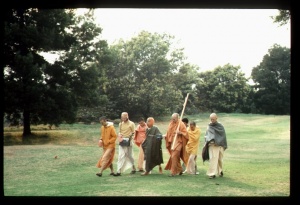CC Antya 1.19 (1975)

A.C. Bhaktivedanta Swami Prabhupada
TEXT 19
- kukkura rahilā,--śivānanda duḥkhī hailā
- daśa paṇa kaḍi diyā kukkure pāra kailā
SYNONYMS
kukkura rahilā—the dog remained; śivānanda duḥkhī hailā—Śivānanda became very unhappy; daśa paṇa—ten paṇa; kaḍi—small conchshells; diyā—paying; kukkure—the dog; pāra kailā—crossed to the other side of the river.
TRANSLATION
Śivānanda Sena, unhappy that the dog had to stay behind, paid the boatman ten paṇa of conchshells to take the dog across the river.
PURPORT
One paṇa is eighty kaḍis, or small conchshells. Formerly, even fifty or sixty years ago, there was no paper currency in India. Coins were generally made not of base metal but of gold, silver and copper. In other words, the medium of exchange was really something valuable. Four pieces of kaḍi made one gaṇḍā, and twenty such gaṇḍās equaled one paṇa. This kaḍi was also used as a medium of exchange; therefore Śivānanda Sena paid for the dog with daśa paṇa, or eighty times ten pieces of kaḍi. In those days one paisa was also subdivided into small conchshells, but at the present moment the prices for commodities have gone so high that there is nothing one can get in exchange for only one paisa. With one paisa in those days, however, one could purchase sufficient vegetables to provide for a whole family. Even thirty years ago, vegetables were occasionally so inexpensive that one paisa's worth could provide for a whole family for a day.